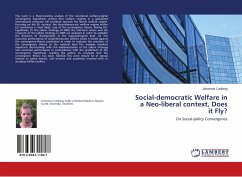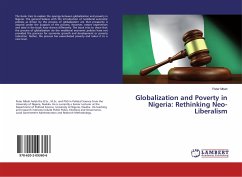
Social-democratic Welfare in a Neo-liberal context, Does it Fly?
On Social-policy Convergence
Versandkostenfrei!
Versandfertig in 6-10 Tagen
32,99 €
inkl. MwSt.

PAYBACK Punkte
16 °P sammeln!
This work is a theory-testing analysis of the neo-liberal welfare-regime convergence hypothesis, stating that welfare regimes in a globalized international economy will converge towards the liberal welfare regime. Focusing on the EU context, the social-democratic welfare regime within EU constitutes a 'most likely' case of the convergence theory. Testing the hypothesis, (1) the Lisbon Strategy of 2000, the mid-term review and the re-launch of the Lisbon Strategy in 2005 are analyzed in order to establish the direction of development at the regional/regime level. (2) The economic performance of...
This work is a theory-testing analysis of the neo-liberal welfare-regime convergence hypothesis, stating that welfare regimes in a globalized international economy will converge towards the liberal welfare regime. Focusing on the EU context, the social-democratic welfare regime within EU constitutes a 'most likely' case of the convergence theory. Testing the hypothesis, (1) the Lisbon Strategy of 2000, the mid-term review and the re-launch of the Lisbon Strategy in 2005 are analyzed in order to establish the direction of development at the regional/regime level. (2) The economic performance of social-democratic welfare states is tested against the convergence-theory predictions in order to evaluate the precision of the convergence theory at the national level. The analyses manifest important shortcomings with the implementation of the Lisbon Strategy and economic performance in contradiction with the predictions of the convergence hypothesis. Leading the author to conclude that the convergence theory has been falsified. This work should be of special interest to policy makers, civil servants and academics involved with or studying welfare politics.












